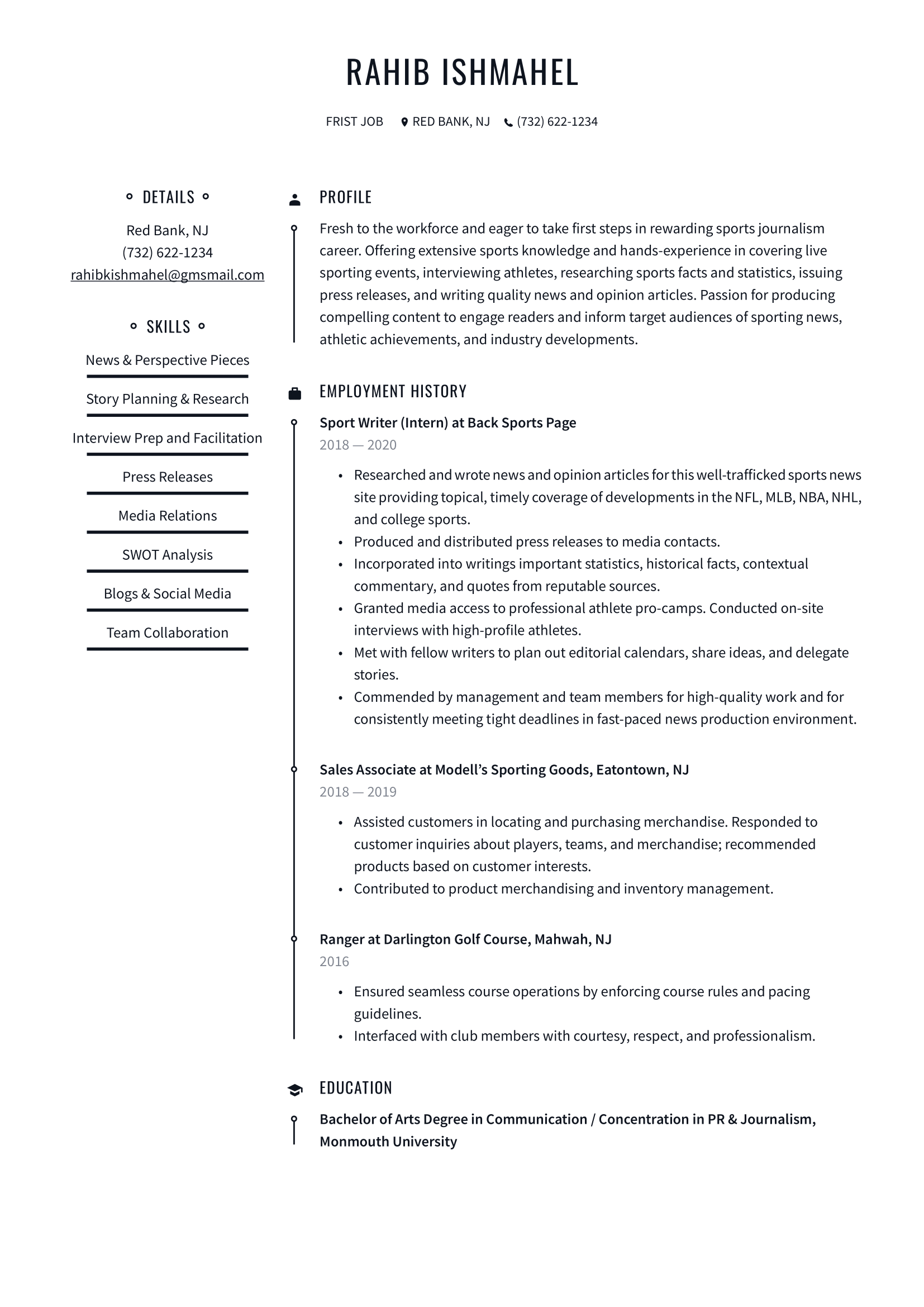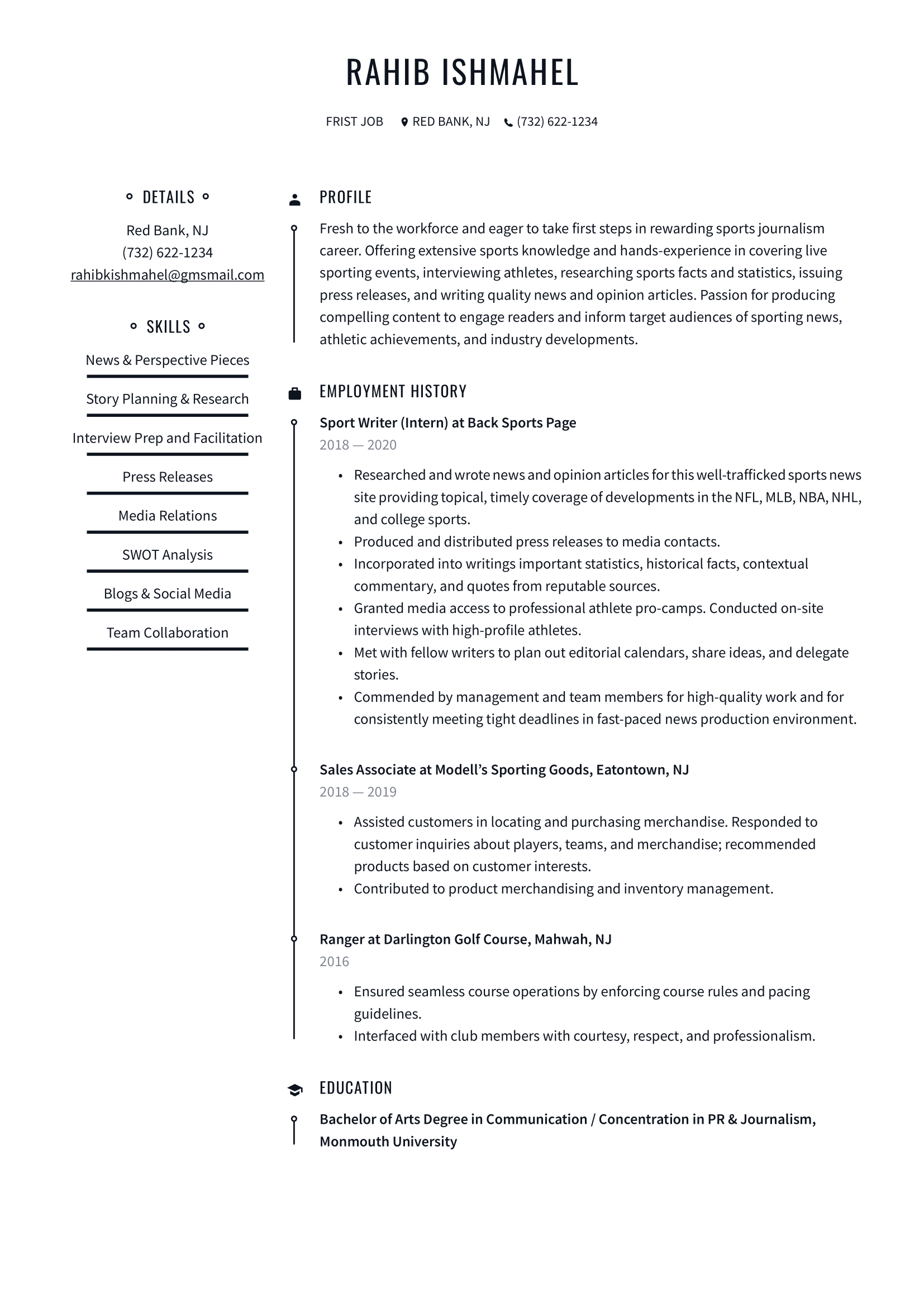- What should your first job resume include?
- How can you create a qualifications summary?
- How should you describe your work experience as a first job?
- Include a fitting first job resume education section
- Which key skills are relevant for a first job resume?
- How to select the most impactful first job resume template
- Copyable first job resume example
- Key takeaways for writing a first job resume
Finding a first job can be challenging. Your first order of business is to create a resume that you can use to get that first fabulous job. What should you include? What format should you use? We’ll cover these questions and more, plus we’ll give you an example resume to help inspire you!
This resume guide will cover the following topics:
What should a first job resume include
Advice on each section of your resume (summary, work history, education)
Adding relevant key skills to your resume
Choosing the right resume template for a first job
What should your first job resume include?
When you’re starting out, you may have little in the way of previous work to put on your resume. So, this means you have to focus on the skills and experience that you can bring to the role. This could include transferable skills and expertise you’ve gained via your academic studies, extracurricular activities, part-time jobs, internships, or volunteer work.
Your first job resume should contain the following elements:
The resume header with your contact information
The qualifications summary and core skills
The education section
The experience section
How can you create a qualifications summary?
Your first job resume needs to open with a qualifications summary that focuses on your educational achievements, relatable internships, volunteer, or part-time work, and relevant soft skills. This section is the first thing a prospective employer will see, so it needs to be a short and sweet snapshot of why you’re the perfect person for the job. Stick to three or four sentences that outline your transferable skills and experience, combined with the unique value you can offer. Phrase this in a way that shows your enthusiasm for joining the workforce, passion for your chosen career path, and the job opening.
See our adaptable first job resume summary below for inspiration.
Fresh to the workforce and eager to take first steps in rewarding sports journalism career. Offering extensive sports knowledge and hands-experience in covering live sporting events, interviewing athletes, researching sports facts and statistics, issuing press releases, and writing quality news and opinion articles. Passion for producing compelling content to engage readers and inform target audiences of sporting news, athletic achievements, and industry developments.
How should you describe your work experience as a first job?
If you're fresh to the workforce, recruiters will understand that you aren’t necessarily going to have any or a lot of work experience. Focus on detailing any relevant and relatable experience you’ve gained via part-time jobs, internships, volunteer work, extracurricular activities, projects, and academic studies. Perhaps you worked part-time in a store so you’ve acquired great customer service skills. Maybe you were elected as captain of the football team, providing you with top-notch team-building, communication, and leadership capabilities. If you’ve completed internships directly related to your chosen field, then these should definitely be highlighted too.
While most job seekers benefit from using a paragraph and bullet strategy (where paragraphs outline core responsibilities and bullet points highlight achievements), this approach isn’t always as effective if you’re targeting your first job. We recommend an all-bullet approach like our example to make your resume direct, succinct, and impactful. Try to include any achievements or recognition where you can:
For example:
Commended by management and team members for high-quality work and for consistently meeting tight deadlines in a fast-paced news production environment.
Take a look at the adaptable first job resume employment history section below.
Sport Writer (Intern) at Back Sports Page 2018 - 2020
Researched and wrote news and opinion articles for this well-trafficked sports news site providing topical, timely coverage of developments in the NFL, MLB, NBA, NHL, and college sports.
Produced and distributed press releases to media contacts.
Incorporated into writings important statistics, historical facts, contextual commentary, and quotes from reputable sources.
Granted media access to professional athlete pro-camps. Conducted on-site interviews with high-profile athletes.
Met with fellow writers to plan out editorial calendars, share ideas, and delegate stories.
Commended by management and team members for high-quality work and for consistently meeting tight deadlines in fast-paced news production environment.
Sales Associate at Modell’s Sporting Goods, Eatontown, NJ 2018 - 2019
Assisted customers in locating and purchasing merchandise. Responded to customer inquiries about players, teams, and merchandise; recommended products based on customer interests.
Contributed to product merchandising and inventory management.
Ranger at Darlington Golf Course, Mahwah, NJ 2016
Ensured seamless course operations by enforcing course rules and pacing guidelines.
Interfaced with club members with courtesy, respect, and professionalism.
Always be truthful on your resume
Creating a resume for your first job can seem like a challenge, but don’t be tempted to lie on your resume to get ahead. Trustworthiness is the foundation of positive working relationships. Making false claims can lead (at best) to embarrassment and a damaged reputation. Worst case scenario, you could lose your job and even face legal consequences (if the lie directly harms the company or its clients).
Include a fitting first job resume education section
Aside from transferable skills and experience, your education section can often be the most important section on your first job resume, particularly if you're a recent graduate. Don’t be shy! Make sure you shine a spotlight on any academic achievements in this section. When crafting your education section consider:
Place your education before the experience section if your studies directly relate to the job opening. Positioning your education section more prominently will ensure it stands out to the hiring manager and tells them you have the right credentials.
Include any standout achievements. Include your GPA (if it’s impressive), honors, relevant courses or projects, clubs/activities, and any completed exchange programs if applicable.
Bachelor of Arts Degree in Communication / Concentration in PR & Journalism at Monmouth University
Which key skills are relevant for a first job resume?
Before you get your first job, you may not have many or any professional skills to list. However, you’ll have skills you learned in school, playing sports, internships, or volunteer work. Leverage whatever you can to build a convincing resume.
Your key skills section should be placed just after your professional summary. Here you can include up to 8 or 9 keywords that highlight your top-flight skills. The job description is the best reference point for keywords for your first job resume. Look out for terms that are repeated or emphasized as important as these will be the keywords you want to include.
Your resume will most likely be scanned by ATS systems that parse your resume for keywords and rank them by how closely they match the job description. (To learn more about conquering the ATS, check out our article Resume ATS optimization.) The keywords you include will very much depend on the role you are targeting, but here’s some first job keywords to give you a little inspiration:
Customer service
Team collaboration
Communication
Critical thinking
Project coordination
IT skills (MS Office Suite etc.)
News & Perspective Pieces
Story Planning & Research
Interview Prep and Facilitation
Press Releases
Media Relations
SWOT Analysis
Blogs & Social Media
Team Collaboration
How to select the most impactful first job resume template
Now that you have all of your information, it’s time to put it into a resume format. So, what format should you use? Recruiters receive zillions of resumes so the best approach is to select a neat, clean, and easy to read format that displays information in clear sections. Don’t use fancy fonts or colors. Keep it simple. You also want to keep it short. One page is typically best for your first job.
When exploring our many resume templates in our resume builder, start by selecting the resume layout that fits your situation best. Find inspiration with our over 100 available resume examples.
Copyable first job resume example
Summary example
Fresh to the workforce and eager to take first steps in rewarding sports journalism career. Offering extensive sports knowledge and hands-experience in covering live sporting events, interviewing athletes, researching sports facts and statistics, issuing press releases, and writing quality news and opinion articles. Passion for producing compelling content to engage readers and inform target audiences of sporting news, athletic achievements, and industry developments.
Employment history example
Sport Writer (Intern) at Back Sports Page 2018 - 2020
Researched and wrote news and opinion articles for this well-trafficked sports news site providing topical, timely coverage of developments in the NFL, MLB, NBA, NHL, and college sports.
Produced and distributed press releases to media contacts.
Incorporated into writings important statistics, historical facts, contextual commentary, and quotes from reputable sources.
Granted media access to professional athlete pro-camps. Conducted on-site interviews with high-profile athletes.
Met with fellow writers to plan out editorial calendars, share ideas, and delegate stories.
Commended by management and team members for high-quality work and for consistently meeting tight deadlines in fast-paced news production environment.
Sales Associate at Modell’s Sporting Goods, Eatontown, NJ 2018 - 2019
Assisted customers in locating and purchasing merchandise. Responded to customer inquiries about players, teams, and merchandise; recommended products based on customer interests.
Contributed to product merchandising and inventory management.
Ranger at Darlington Golf Course, Mahwah, NJ 2016
Ensured seamless course operations by enforcing course rules and pacing guidelines.
Interfaced with club members with courtesy, respect, and professionalism.
Education example
Bachelor of Arts Degree in Communication / Concentration in PR & Journalism at Monmouth University
Skills example
News & Perspective Pieces
Story Planning & Research
Interview Prep and Facilitation
Press Releases
Media Relations
SWOT Analysis
Blogs & Social Media
Team Collaboration
Key takeaways for writing a first job resume
Creating your resume for your first job is an exciting time, but it can feel a bit daunting. Don’t fret though. Recruiters will understand that you're just starting out on your career journey.
If you’re a recent graduate, place your Education section at the beginning of your resume (just after the opening qualifications summary) and include any academic achievements.
Detail part-time jobs, internships, volunteer work, extracurricular activities, and/or projects in the experience section. Just make sure they are relatable to the job opening.
Make your life easier by using our online resume builder to create your first job resume with adaptable templates and AI-powered content.


